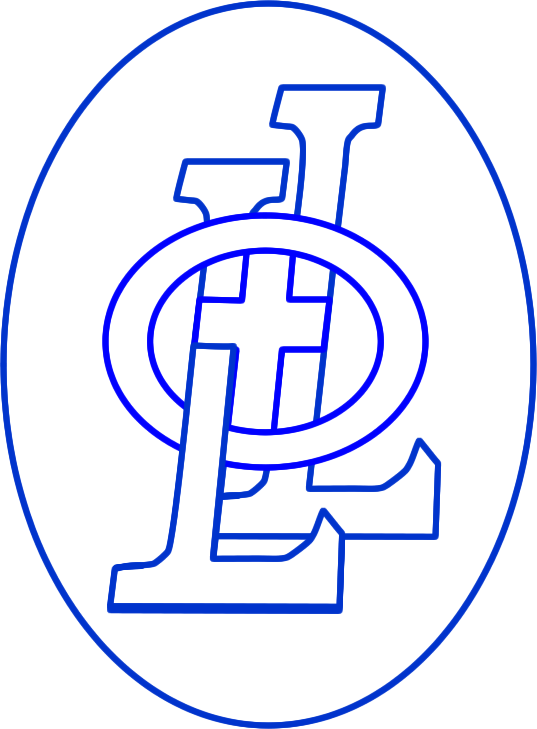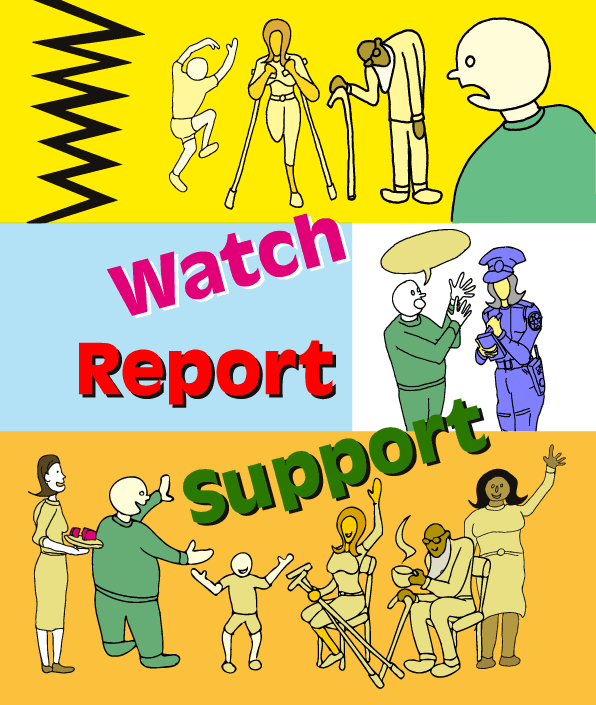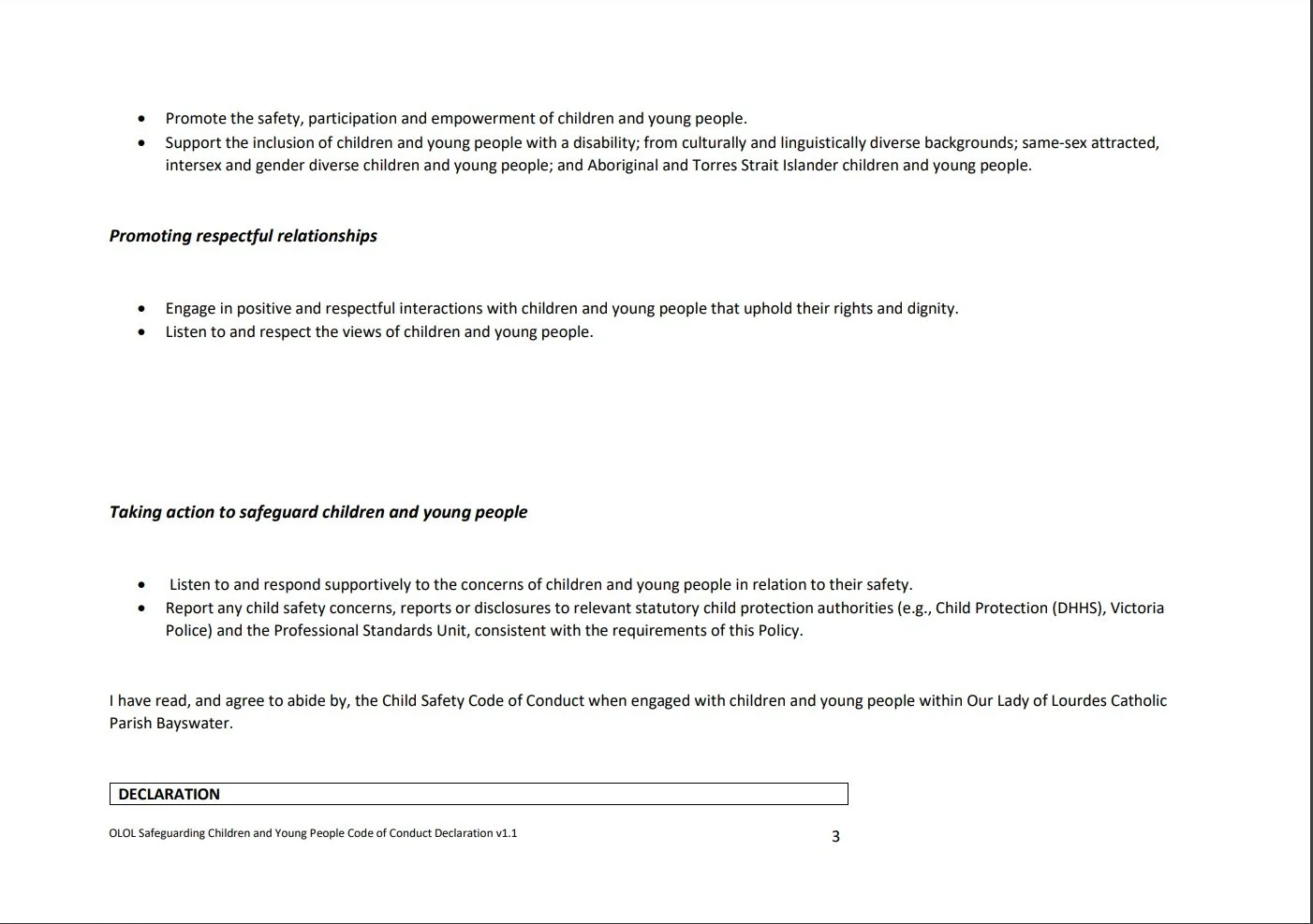SAFEGUARDING POLICY SUMMARY
Our Lady of Lourdes Catholic Parish, Bayswater (OLOL) and the broader Catholic Archdiocese of Melbourne (CAM) have a mission-driven moral and legal responsibility to create nurturing environments where children and young people are respected, where their voices are heard, and where they feel safe and are safe.
OLOL screens all personnel and volunteers and educates Parishioners about abuse awareness and prevention. Our Parish implements Church and Government safeguarding standards in co-ordination with CAM.
OLOL prevents abuse by maintaining a code of conduct, co-ordinating induction processes and providing safeguarding training. Volunteer roles involving children and other vulnerable people are supervised and behavioural guidelines are provided. Relevant activities and Parish events are subject to risk assessments.
OLOL encourages mandatory abuse reporting and co-ordinates with CAM Professional Standards Unit (PSU) to handle disciplinary actions.
DETAILS
This policy covers the measures needed to safeguard against abuse. Our Lady of Lourdes Catholic Church Bayswater aims to ensure that none of its personnel or volunteers engages in behaviour that could allow abuse to occur or actions that could be misinterpreted by children, their families or other adults as constituting, or leading to abuse. We take every possible effort to safeguard against abuse and harm.
Duty of care
OLOL and The Catholic Archdiocese of Melbourne (CAM) holds the care, safety and wellbeing of children and young people as a fundamental responsibility of the Church. This commitment is drawn from, and inherent to, the teaching and mission of Jesus Christ, with love, justice and the dignity of each human person at the heart of the Gospel.
Right to safety and participation
A culture of safety within the Church ensures that children and young people (defined as a person under 18 years of age) can actively and fully participate in the life of the Church and realise their potential in a faith community. OLOL and CAM have a zero tolerance for all forms of child abuse and maltreatment and is committed to protecting children and young people from harm.
Child abuse
Child abuse or maltreatment is defined as an act (or series of acts) that endangers a child or young person’s physical or emotional health or development and/or a failure to provide conditions to the extent that the health and development of the child or young person is significantly impaired or placed at risk.
Categories of abuse and maltreatment include:
physical abuse
sexual abuse including grooming
emotional abuse including spiritual abuse
family violence
neglect
discrimination
bullying
Signs and indicators of child abuse or maltreatment are not always obvious. Physical abuse may be more visible than other forms of abuse (e.g. bruising).
Neglect is harder to identify as it consists of a failure to provide adequate care and attention. Likewise, you may not witness discrimination or bullying in relation to disability, mental illness, family violence, skin colour or race, gender identity or sexual orientation. However, it may result in signs or indicators in the child’s behaviour, for example social withdrawal and depression.
All children and young people are vulnerable but there are some children and young people who have an even higher risk of abuse than the general population.
They are children who have experienced abuse before or who have a disability, are from culturally and linguistically diverse backgrounds, those experiencing poverty or homelessness or out of home care. Similarly, the child safety needs of Aboriginal and Torres Strait Islander children and young people are more acute due to a history of racism, marginalisation and dispossession.
Dignity of children and young people
OLOL and CAM value the contribution and dignity of all children and young people and creates opportunities to involve children and young people in decision-making about programs, activities and events that affect them. OLOL and CAM recognises that the need for empowerment of all children and young people, especially those at greater risk of abuse. Their involvement in decision-making can be a significant protective factor in preventing abuse within Church organisations.
Informing and involving parents (and guardians) in promoting child safety
OLOL and CAM acknowledges that effective child safety within parishes, agencies and entities cannot be undertaken without the involvement of parents (and guardians) and seeks to engage parents as critical partners in promoting the safety of children and young people. The involvement of parents and guardians of children and young people who are more vulnerable to experiencing abuse is particularly important.
Safeguarding children and young people within Our Lady of Lourdes Parish and the Catholic Archdiocese of Melbourne
OLOL and CAM acknowledges that preventing child abuse requires proactive approaches across policies, procedures and practices consistent with the requirements of the:
Safe Standards and the Reportable Conduct Scheme (Commission for Children and Young People, Victoria)
National Principles for Child Safe Organisations (Australian Human Rights Commission)
National Catholic Safeguarding Standards (Catholic Professional Standards Limited)
In fulfilling this responsibility, CAM has developed a comprehensive framework to guide the implementation of child safety policies, procedures and practices within parishes, agencies and entities with the aim of preventing child abuse, empowering children and young people, and responding to concerns, disclosures or allegations of child abuse or child-related misconduct.
This policy provides a broad overview of the framework and should be read in conjunction with supporting resources e.g. implementation guidelines, factsheets, templates.
The application of this policy extends to clergy, employee and volunteer behaviour within the context of their role within the Church: within the physical boundaries of OLOL and CAM (e.g. churches, parish halls, presbyteries); beyond the physical boundaries including pastoral support, visitation or outreach on non-church property (e.g. hospitals, detention centres, prisons, homes), online or via digital environments and while travelling outside the Archdiocese whether locally, interstate or overseas.
Safeguarding responsibilities
Through the Professional Standards Unit, the Archbishop supports and assists parishes, agencies and entities to:
implement safeguarding practices and processes outlined in this policy
coordinate the response to allegations and reports of child safety related misconduct and child abuse in relation to clergy, employees and volunteers across the Archdiocese
monitor and continually improve safeguarding practices and processes.
CAM parish, agency and entity leadership is responsible for ensuring compliance with this policy and relevant procedures and practices within each parish, agency and entity to protect children and young people.
The PSU will require the leadership of each parish, agency or entity with its Safeguarding Committee to summarise its compliance with the requirements of this policy on an annual basis.
The Safeguarding Committee established within each parish, agency or entity plays a central role in assisting the parish priest, or agency or entity leader with implementation of the requirements of this policy.
Further, as safeguarding children and young people is a collective responsibility; all persons in ministry, working or volunteering within CAM acknowledge their individual responsibility to comply with clear behavioural expectations to act in manner that is caring, respectful and safe toward children and young people.
Every member of the clergy, employee or volunteer within the Archdiocese has a moral, legal and ethical responsibility to care for, and promote the wellbeing of children and young people, and protect them from harm or abuse.
This applies to all those involved in Archdiocesan parishes, agencies and entities including:
clergy, including all canonical administrators of a parish (e.g. bishop, parish priest, assistant priest, migrant chaplains, visiting clergy, priests in residence, supply clergy, deacons)
Sisters, Brothers and Religious Priests holding an appointment from the Archbishop to undertake work in parish or Archdiocesan entities
employees (including casual employees)
lay ecclesiastical ministers including pastoral associates, those engaged in chaplaincy
volunteers
seminarians
persons residing at the presbytery or on the grounds of the parish, agency or entity
students on placement
contractors (where applicable)
The OLOL and CAM Safeguarding Children and Young People Policy parallels the development of similar policies in a range of CAM organisations involved in education, health and welfare. CatholicCare, Catholic Education Melbourne, Catholic systemic schools, Mannix College and Villa Maria Catholic Homes all have safeguarding policies and personnel working or volunteering in these organisations will be guided by these policies and are not bound by the CAM Safeguarding Children and Young People Framework.
Safe Personnel
Selection, recruitment and screening
OLOL and CAM in seeking to provide safe and enriching interactions with children and young people within the context of parishes, agencies and entities, sets out selection, recruitment and screening processes that consider the suitability and appropriateness of persons to work with children and young people in ministry or in an employment or voluntary role to minimise the risk of child abuse occurring.
Child safety code of conduct
A specific child safety code of conduct provides guidance to clergy, employees and volunteers in the context of their involvement with children and young people in their parish, agency or entity role.
Induction
Induction processes incorporate safeguarding awareness to build a foundation of understanding and commitment to the safety of children and young people.
Safeguarding Training
In supporting clergy, employees and volunteers to promote the safety of children and young people and discharge their responsibilities in line with this policy, OLOL and CAM provides a range of training and education activities that equip clergy, employees and volunteers with the skills and knowledge to promote the safe participation of children and young people.
Supervision
It is a requirement of this policy that those whose roles involve working with children and young people are provided with supervision and support to undertake their role in a manner which promotes the safety of children and young people and enables detection of behaviour that may be detrimental to children and young people.
Safe Programs, Activities And Events
Child safety risk management
OLOL and CAM parishes, agencies and entities safeguard children and young people by employing a risk management approach that systemically identifies and assesses risk associated with programs, activities and events involving children and young people to minimise opportunities for harm to occur.
Practice and behavioural guidelines
In addition to risk management process, parishes, agencies and entities utilise guidance provided in practice and behavioural guidelines in relation to conducting programs, activities and events involving children and young people.
Responding to and reporting child abuse
The safety of children and young people is paramount. All concerns, allegations or complaints of child abuse will be taken seriously, and acted upon consistent with the Catholic Archdiocese of Melbourne’s moral, ethical and legal obligations to safeguard children and young people.
In Victoria, the following legislation governs how adults should respond to child abuse:
The Children, Youth and Families Act 2005 (Vic) defines when a child is in need of protection (s 162) and the mandatory reporting obligations of certain professionals working in our community (ss 182, 184).
The Child Wellbeing and Safety Act 2005 (Vic) sets out the Reportable Conduct Scheme.
The Crimes Act 1958 (Vic) creates the offences of ‘failure to protect’ (s 49O) and ‘failure to disclose’ (s 327) which place additional legal responsibilities in relation to reporting, if a reasonable belief has been formed that a child or young person is at risk of or experiencing child sexual abuse.
OLOL and CAM acknowledges its moral, legal and ethical duty to effectively respond to and report concerns, allegations or complaints of child-safety related misconduct and/or child abuse to the appropriate authorities such as the Victoria Police, Child Protection (Department of Health and Human Services) and the Reportable Conduct Scheme (Commission for Children and Young People).
Children and young people (and their families) within OLOL and CAM have information and support to report a concern, allegation or make a complaint through processes that are accessible and respectful.
It is a requirement of this policy that OLOL and CAM clergy, employees and volunteers, make a report if they have formed a reasonable belief that a child or young person has experienced abuse, is experiencing abuse or is at risk of harm in the course of their ministry or work. Not reporting child abuse or misconduct that places children and young people at risk of harm is a breach of the Safeguarding Children and Young People Policy.
Making a child abuse report involves notifying statutory authorities and the Professional Standards Unit (PSU) of the Catholic Archdiocese of Melbourne in a timely manner (as soon as practicable after forming a reasonable belief, unless the child or young person is in imminent danger).
Reporting to the PSU ensures that parishes, agencies and entities across the Archdiocese report and respond appropriately to concerns, allegations of complaints in relation to safety of children and young people.
Immediate danger if a child or young person is in imminent danger, a report to Victoria Police must be made immediately (phone ‘000’)
All reports are to be documented on the Child-safety Related Misconduct and/or Child Abuse Report Form and emailed to the Professional Standards Unit – professional.standards@cam.org.au – as soon as practicable.
In Victoria, alleged child abuse perpetrated by:
clergy, employees and volunteers is reported to the Sexual Offences and Child Abuse Investigation Team (SOCIT) within Victoria Police
a family member is reported to Child Protection - Department of Health and Human Services (DHHS)
a child or young person is reported to Child Protection (DHHS) and/or the SOCIT (Victoria Police) (e.g. sexually harmful behaviour, aggression, violence, online exploitation).
VICTORIA POLICE
Sexual Offences and Child Abuse Investigation Team (SOCIT): www.police.vic.gov.au/content.asp?Document_ID=36448
CHILD PROTECTION (DHHS)
North and West (Metro) region: 1300 664 9777
South region: 1300 655 795
East region: 1300 360 391
West (Rural) region: 1800 075 599
After-hours and weekends: 13 12 78
PSU’s role in relation to reports of alleged child-related misconduct and/or child abuse
The Professional Standards Unit (PSU) is responsible for coordinating child-safety related misconduct and child abuse reports in relation to the safety and wellbeing of children and young people and liaising with statutory authorities.
The PSU will be guided by the recommendations of Victoria Police and/or Child Protection in relation to any action that may be required to promote the safety of those involved and the integrity of the investigation process.
OLOL and CAM have a legal responsibility under the Reportable Conduct Scheme to notify current and historical incidents of suspected child abuse or misconduct of clergy, employees and volunteers to the Commission for Children and Young People (CCYP).
Serious misconduct and/or criminal behaviour will be reported to the Reportable Conduct Scheme (Commission for Children and Young People) and/or Victoria Police and be subject to internal investigation and disciplinary action (and/or administrative action subject to the requirements of Canon Law for members of the clergy).
Disciplinary action is determined by the seriousness of the misconduct.
Disciplinary action in the case of employees and volunteers may consist of:
counselling
training
a verbal or written warning
suspension (with or without pay)
dismissal.
In the case of clergy, disciplinary and/or administrative action will be considered in accordance with Canon Law and may include:
pastoral supervision
counselling
suspension of faculties
permanent removal of faculties
recommendation to the Holy See for a penal precept or dismissal from the clerical state (laicisation)
excommunication.
Confidentiality and privacy in relation to reports of child abuse will be maintained consistent with the principles of natural justice and our duty of care to safeguard children and young people.
The safety and support needs of all parties involved in a report will be considered and addressed as part of this process.
The PSU will centrally record and monitor child-safety related misconduct and/or child abuse to provide the Archbishop with oversight in relation to the safety and wellbeing of children and young people across the Archdiocese.
Professional Standards Unit
hours of operation: Monday to Friday, 9am-5pm
phone: 9926 5630
OLOL CHILDREN’S LITURGY OF THE WORD SIGN-IN SYSTEM
FOR 10AM SUNDAY MASSES AT OUR LADY OF LOURDES NARTHEX
1. To keep children safe and accounted for during the children’s liturgy, parents/guardians of children who are not participating for the duration of the liturgy must sign their children in before the Mass starts.
2. The parents/guardians must remain in the Church while their child or children are participating in the Children’s Liturgy.
3. There will be a sign-in sheet in the Narthex children's liturgy section.
4. The liturgy leader on the day or their assistant will monitor the sign-in process and answer any questions.
5. When the liturgy starts if there are any children present that are not signed in then they will be sent to their parents in the Church. The hope would be that the parents would then return to the liturgy to sign them in.
6. When the liturgy finishes but before the offertory procession the parents must sign their children out.
If you have been abused, witness abuse or suspect abuse, please contact the Police immediately.
Please also inform the Catholic Archdiocese of Melbourne Professional Standards Unit by phone: (03) 9926 5621 and/or email: professional.standards@cam.org.au
For further information on Parish Safeguarding policies please contact our Safeguarding Representative:
Michael Anderson










